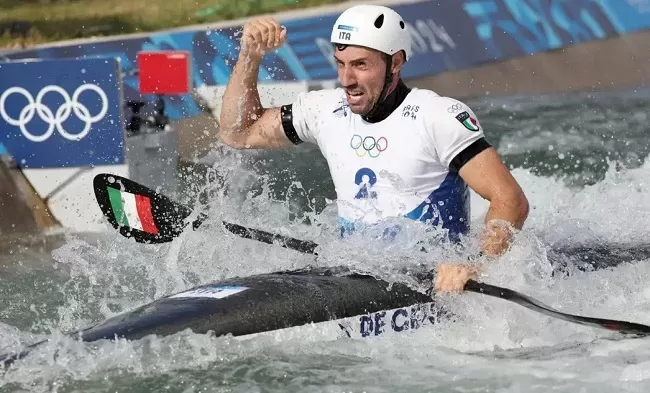PARIS — Italy’s Giovanni De Gennaro’s stunning gold medal run in single kayak slalom final brought to an end three years of misery for the Italian, who finished a disappointing 15th in Tokyo – a result that fired him up for his Paris success.
De Gennaro blasted down the tricky course in a time of 88.22 seconds and then watched as his rivals failed to beat his mark, eventually being crowned Olympic champion after Britain’s Joe Clarke, the final racer of the day, could not dislodge him.
“I’m in disbelief, I don’t know what’s happening. I’m just super happy that I have this piece of gold in my on my neck and it’s just amazing,” he told Reuters, still in shock at his win.
“Just an amazing day. I’m so happy my family’s here and I could share this emotion with the crowd.”
With the 12 finalist going in reverse order based on their performance in the semi-final earlier in the afternoon, De Gennaro found himself descending the course fifth, and when his run was complete he knew he was in with a chance of gold.
“I thought it could be … I had a little mistake in the middle part where I lost, I think, one second in something, so I thought there was still room for someone to get in front of me. But yeah, in the end the time was enough,” he said.
The ensuing wait to see if he had done enough was a tough one.
“(It was) the longest 10 minutes of my life, and maybe even more. They are all great athletes, they can all fight for the gold, so I knew there was nothing sure. I just wished I had a medal, and I have the heaviest one now so I’m super happy,” he said.
De Gennaro’s gold medal-winning performance was a testament to his precision and control, earning him enthusiastic celebrations from the Italian team. The gold was a fitting reward for his skillful execution.
Meanwhile, France’s Titouan Castryck, who was guaranteed at least a bronze after Germany’s Noah Hegge dropped out of contention, secured the silver medal. The home crowd celebrated his achievement with great fervor.
Spain’s Pau Echaniz completed the podium with a bronze medal, rounding off a remarkable competition.
For Clarke, the final was a moment of disappointment. As he watched his final time appear on the scoreboard, his head in his hands, the weight of missed opportunities was evident.
Clarke looked unbeatable when qualifying fastest for the 12-man canoe slalom final at the Vaires-sur-Marne Nautical Stadium course.
But the 31-year-old Stoke-on-Trent paddler – K1 gold medallist at Rio de Janeiro eight years ago – could do no better than fifth in a final won by Italy’s Giovanni de Gennaro in an impressive time of 88.22 seconds.
“It was a very fast final,” said Clarke, the last man down the 300-metre course as the fastest qualifier in the semi-final.
“I don’t think I did too much wrong, just a couple of mistakes.
“It was an immense final, the time differences were so finite. It’s hard to beat yourself up when it is so close.
‘Fifth place wasn’t what I came here for, but I’ve still got another chance for a medal,’ said the Team GB paddler. ‘It’s definitely added a few coals to the fire for the kayak cross later in the week.’
Despite a valiant effort and a strong comeback from missing the Tokyo Olympics, it was not enough to reclaim the top spot.
The final vividly illustrated the intense competition and the narrow margins that define elite slalom racing. Giovanni de Gennaro’s victory, along with the notable performances from Castryck and Echaniz, contributed to a dramatic and unforgettable event, showcasing the high stakes and exceptional skill present in the sport.
Australia’s Jessica Fox pulled off another sensational descent at the Vaires-sur-Marne Nautical Stadium to win her second gold of the Paris Games on Wednesday, adding the women’s canoe single title to the kayak single gold she secured Sunday.
Germany’s Elena Lilik took the silver, and American Evy Leibfarth bagged an unexpected bronze.
But once again Fox stole the show with an incredible winning run of 1 minute, 1.06 seconds.
“I don’t know how I did that. The atmosphere was incredible. I looked out, and I saw so much green and yellow, so many Aussie flags, and I think that was the best run I’ve ever done,” Fox said.
“I knew once I had got through the hard moves, it was about trying to get to the finish and holding it together and wow!”
Leibfarth went out first in the final, setting the pace with a run of 1:09.95 that looked like it wouldn’t top the standings for long, but the next four racers came and went and none of them could knock her off her perch.
She was finally bumped down to second when Lilik went out sixth, putting in a flawless high-octane run that saw her slide into first place with a lead of more than six seconds, the 25-year-old shrieking with joy when she saw her final time.
With the tricky course forcing costly errors from some of the world’s top paddlers, Lilik’s time looked better and better as the final went on.
Second to last to go, Fox flew down the course, attacking every downstream gate with gusto and teeing herself up for the upstream gates with tremendous precision. She took only a two-second penalty for brushing the 19th gate.






Discussion about this post